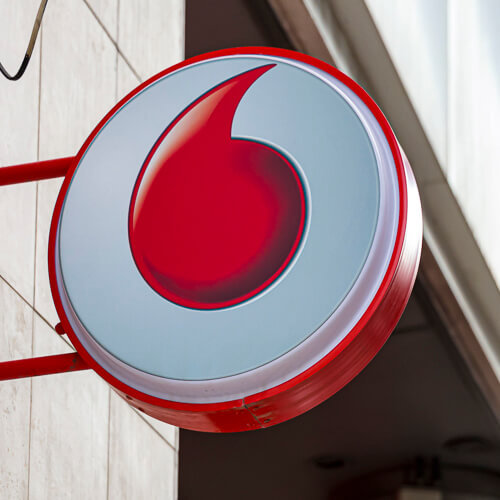Vodafone warns prices must rise as its energy bill soars
The UK-based operator tells analysts that consumer prices across the industry must go up unless service providers are prepared to sacrifice profitability.

Europe's smartphone users arguably enjoy the most affordable services on the planet in some of its most competitive markets, but they may be in for a shock. As the industry grapples with inflation and surging energy fees, one of its biggest operators is suggesting prices may have to rise at their steepest rate in years.
The warning came from Vodafone as it reported sales growth of just 1.6% for its recently ended first quarter, to about €11.3 billion ($11.6 billion), compared with the year-earlier period. Active across Europe and Africa, the UK-based company does not report details of profitability in quarterly trading updates. But executives worry that margins will be squeezed badly unless customers pay more.
"I don't want to make it sound as if we are coordinating pricing across Europe, because that definitely is not happening," said Nick Read, Vodafone's CEO, on a call with financial analysts earlier today. "Price is very difficult to talk about. All I am saying is the pressure from energy is starting to feed through to industry to say we are not going to make this up on customer volume. We've got to pull the price lever. Every other sector is doing it. Why are we not doing it? I think there needs to be a response industry-wide."
Figure 1: Vodafone share price in London ( GB pound )  (Source: Google Finance)
(Source: Google Finance)
Based on current volatility in energy prices, Vodafone now thinks it is facing an additional €300 million ($307 million) in energy costs this fiscal year. It has been hedging (essentially, buying in advance) to mitigate risks and is trying to sign purchase price agreements with energy suppliers.
"There is a substantial level of uncertainty about energy and a key driver is the geopolitical news flow, but also what governments do about this and where consumption will go," said Margherita della Valle, Vodafone's chief financial officer.
Ratings agency Moody's estimates that energy accounts for as much as 5% of operating costs at a typical European telco, and the figure could rise as energy costs escalate and hedging arrangements expire.
"Most operators are well hedged in 2022, with around two-thirds of costs hedged on average, but this starts to unwind progressively from 2023," said the company in a research paper this month. Della Valle puts Vodafone's rate of hedging for the current fiscal year at 85%.
Wage bill less worrying
She appears less concerned about staff costs – which account for as much as 25% of the typical operator bill, according to Moody's – despite the inflationary pressure. Vodafone has already tackled the wage issue for the current fiscal year in its key European markets, she told analysts today, guiding for "low-single-digit increases on this front."
Group headcount has dropped from a high point of 111,684 in 2015 to 96,941 in the recent fiscal year as Vodafone has divested local operating companies, spun off assets and cut jobs in underperforming markets. Efficiency improvements lifted its earnings margin after leases to 33.4% last year, from 31.9% in 2019.
Yet boosting or even defending profitability will be much harder in future. Headcount has risen in each of the last two fiscal years and since late 2021 Vodafone has been working to increase the number of software engineers it employs from about 9,000 to roughly 16,000 by the mid-2020s. It does, however, believe it can offset the costs of this program by cutting its use of contractors and reliance on external suppliers.
Want to know more about 5G? Check out our dedicated 5G content channel here on Light Reading.
Analysts are skeptical operators will be able to jack up tariffs in Europe without suffering a loss of customers to rivals. "European telecoms are exposed to persistently high inflation because intense competition in Europe hampers their ability to pass through rising costs to final customers through price increases," said Moody's in its recent report.
Quizzed on that issue, Read said that all companies were facing higher costs and would need to adapt prices or sacrifice profitability. "Everyone is going to be under cost pressure, and this might be the first year we see value brands having to respond, or there will be margin squeeze," he said. Vodafone is now considering moves to support "people struggling with payments," he added.
Guidance unchanged
The remarks came days after AT&T in the US lowered its cash flow forecast because customers are taking longer to pay bills. Vodafone, however, is for now sticking to guidance of about €5.3 billion ($5.4 billion) in free cash flow for this fiscal year, along with earnings after leases of between €15 billion ($15.4 billion) and €15.5 billion ($15.9 billion). Last year, it reported €5.2 billion ($5.3 billion) in free cash flow and €15.2 billion ($15.6 billion) in earnings after leases.
Vodafone last year completed the divestment of its European towers and is currently in talks with several parties about selling a stake in Vantage Towers, the company that was formed. Vodafone today owns 81.7% of the business, valued at about €14 billion ($14.3 billion) in Frankfurt, and has insisted it will retain at least a 50% stake to ensure it has "co-control" of the assets. Read's position contrasts with that of Deutsche Telekom and Spain's Telefónica, both of which have sold controlling stakes in tower ventures.
"I don't think us having co-control is inhibiting anything around value," said Read today. "We have strong interest from serious players and, so far, our objectives do not stand in the way of value from a transaction perspective."
Related posts:
— Iain Morris, International Editor, Light Reading
Read more about:
EuropeAbout the Author(s)
You May Also Like




_International_Software_Products.jpeg?width=300&auto=webp&quality=80&disable=upscale)







